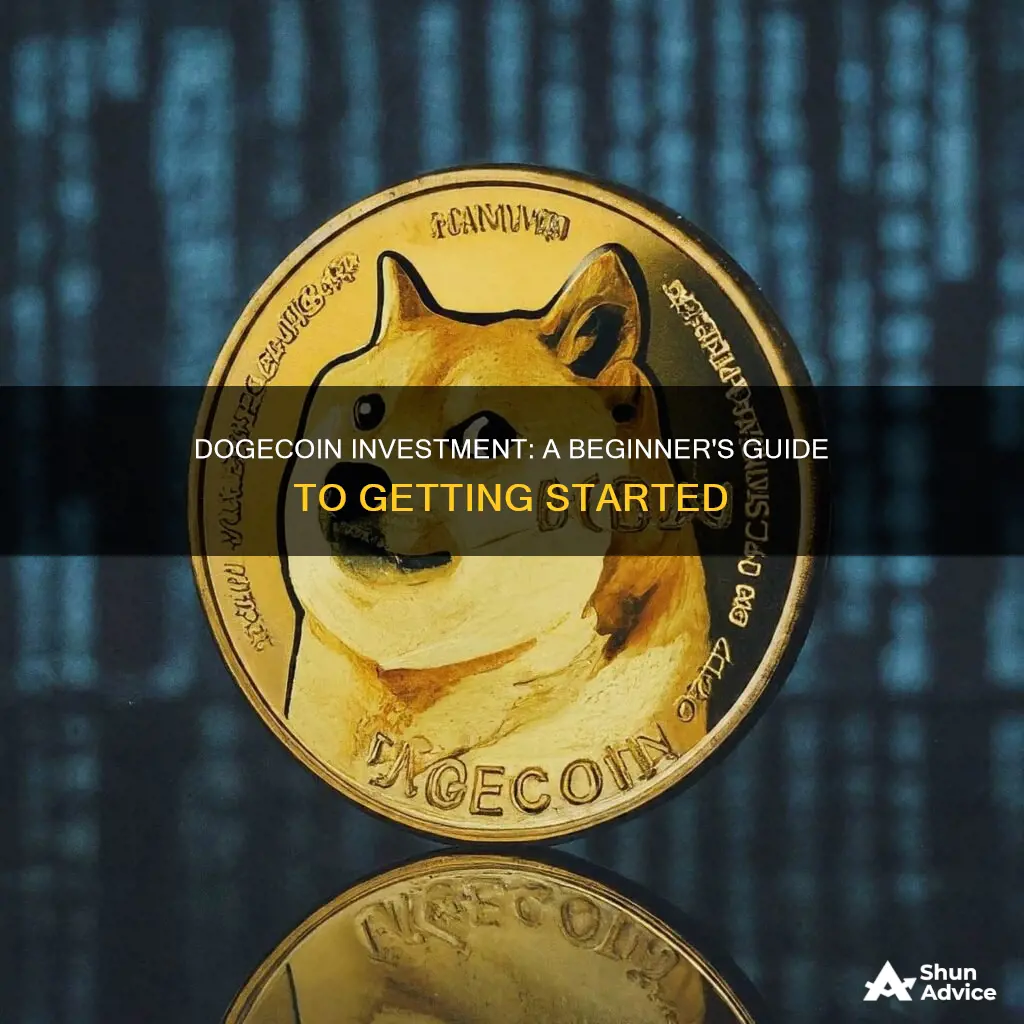
Dogecoin is a cryptocurrency that was initially created as a joke based on a popular internet meme. Despite its lighthearted origins, Dogecoin has gained a devoted community and a passionate following on Reddit. It has also received endorsements from celebrities such as Elon Musk, Snoop Dogg, and Mark Cuban.
Dogecoin is considered a risky and volatile investment due to its unlimited supply and susceptibility to social media movements and hype. However, it has seen surges in value and growing mainstream acceptance, making it a promising crypto asset for some.
If you are considering investing in Dogecoin, it is important to do your research and understand the risks involved. Here are some key steps to help you get started:
- Choose a cryptocurrency exchange that offers Dogecoin, such as Coinbase, Kraken, or Binance.
- Set up an account on the exchange and verify your identity with personal details.
- Deposit funds into your account using a supported payment method, such as a bank account or credit card.
- Search for Dogecoin on the exchange, check its market price, and place your order.
- Consider storing your Dogecoin in a secure crypto wallet, either hot (digital) or cold (physical hardware).
What You'll Learn

Choosing a wallet
Hot wallets are connected to the internet, making them more susceptible to hacking but also more convenient to access. Examples of hot wallets include mobile apps, browser extensions, and downloadable software. They are usually free to use and can be set up in a matter of minutes. Some popular hot wallet options include Exodus, Coinomi, and the official Dogecoin Wallet, although the latter is no longer actively supported and many users have reported losing funds.
Cold wallets, on the other hand, are not connected to the internet, making them more secure but less convenient. They are usually hardware devices, such as the Ledger Nano X, Trezor Model T, and KeepKey. Cold wallets tend to be more expensive, and some may have a steep learning curve, especially for those new to cryptocurrency.
When choosing a wallet, it is important to consider factors such as security, ease of use, backup and restore options, ongoing development, and customer support. It is also crucial to research the wallet's provider and check independent reviews to ensure the safety of your funds.
Martin Lewis' Bitcoin Investment Guide: Is It Worth It?
You may want to see also

Selecting an exchange
Security and Reputation
Start by researching the security measures and reputation of the exchange. Look for exchanges that prioritize security, such as two-factor authentication and encryption protocols. Check reviews and ensure the platform has a good track record of protecting user funds and personal information.
Supported Cryptocurrencies
Ensure that the exchange offers a wide range of cryptocurrencies, including Dogecoin. Some exchanges may not support Dogecoin, so verify this before signing up. It is also beneficial to choose an exchange that offers a variety of crypto pairs, such as DOGE/USDT or DOGE/BTC, to provide flexibility in your trading options.
Liquidity and Trading Volume
Opt for exchanges with high liquidity and substantial trading volume. Higher liquidity means that there are enough buyers and sellers to facilitate your trades without significant price slippage. Exchanges with higher trading volumes tend to have better price stability and liquidity.
Fees and Payment Methods
Compare the fees charged by different exchanges. These may include deposit, withdrawal, trading, and transfer fees. Look for exchanges with competitive and transparent fee structures. Additionally, ensure that the exchange supports your preferred payment method, whether it's a bank transfer, credit card, or another cryptocurrency.
User Interface and Functionality
Choose an exchange with a user-friendly interface that is intuitive and easy to navigate. Look for features like order books, charting tools, and price alerts to help you make informed trading decisions. Some exchanges also offer advanced trading options, such as margin trading and futures, for more sophisticated traders.
Regulatory Compliance and Licensing
Select an exchange that is regulated and licensed in your jurisdiction. Regulatory compliance adds an extra layer of security and helps ensure the exchange adheres to specific standards and consumer protection measures. Check for licenses and registrations with relevant financial authorities.
- Coinbase
- Binance
- Kraken
- Robinhood
- Webull
- EToro
- MEXC Global
- Bybit
Remember to do your due diligence before selecting an exchange and always consider the risks associated with investing in cryptocurrencies.
Strike Bitcoin: A Guide to Investing in the Crypto Giant
You may want to see also

Payment methods
There are two main ways to pay for Dogecoin: cash or cryptocurrency.
Cash
To buy Dogecoin with cash, you'll need to create an account with a cryptocurrency exchange, such as Coinbase, Binance, or Kraken, and fund that account from your bank account. Most exchanges will let you deposit money from a checking or savings account, and some accept wire transfers and PayPal transfers. You'll then be able to use the funds in your exchange account to purchase Dogecoin.
Cryptocurrency
If you already own cryptocurrency, you may be able to trade it for Dogecoin. However, not all cryptocurrencies can be exchanged for Dogecoin, and the option isn't available on every platform. Make sure the platform you choose allows you to pair Dogecoin with the cryptocurrency you want to trade.
Other Considerations
When choosing a payment method, it's important to keep in mind that purchasing Dogecoin with a credit card can be risky and expensive. Credit card companies typically treat cryptocurrency purchases as cash advances, which means higher fees and interest rates.
It's also worth noting that some payment methods may be faster than others. For example, while bank transfers are secure, they can take several days to clear.
UK Bitcoin Investment: Where to Start?
You may want to see also

Storage options
When you buy Dogecoin, it’s usually kept in your exchange’s or brokerage’s crypto wallet by default. However, because these wallets are generally connected to the internet, some investors choose to withdraw their crypto and store it in another wallet.
There are two main types of crypto wallets: hot wallets and cold wallets. Hot wallets are digital and connected to the internet, while cold wallets are physical hardware that can be disconnected from the internet, making them much less susceptible to hacking.
Cold wallets are generally considered more secure than hot wallets, but they are also more expensive. Additionally, if you lose or forget the password to your cold wallet, you run the risk of being unable to access your cryptocurrency.
- Hot wallets:
- Exodus: A widely used software wallet that supports over 200 cryptocurrencies, including Dogecoin. Although Exodus is a software wallet, it is non-custodial, meaning users have complete control over their private keys. Exodus also offers security features such as PIN protection, biometric login, and auto-lock.
- Coinomi: A popular hot wallet that supports Dogecoin and a wide range of other cryptocurrencies. It offers security features such as seed phrase backup and password encryption.
- Trust Wallet: A mobile hot wallet that provides a seamless and secure Dogecoin storage solution. It gives users full control over their private keys and supports various blockchain networks, including Dogecoin.
- Cold wallets:
- Ledger (Nano X or S): Ledger is a leading hardware wallet provider, and both the Nano X and Nano S support the storage of Dogecoin private keys. Ledger wallets use a unique operating system called BOLOS (Blockchain Open Ledger Operating System) to isolate wallet apps from each other and keep information secure. Ledger wallets also use a Secure Element (SE) chip to safely store seed phrases and private keys.
- Trezor (Model T or One): Trezor is another popular hardware wallet provider with two models: the Model T and the Model One. Trezor wallets store your private keys offline and use firmware that is open-source, allowing users to identify and patch vulnerabilities or bugs. Trezor wallets also offer security features such as two-factor authentication, PIN protection, and an ultrasound hardware seal.
- KeepKey: A trusted hardware wallet developed by ShapeShift, a well-known DeFi platform. KeepKey supports over 40 cryptocurrencies, including Dogecoin, and offers security features such as PIN protection and passphrases. KeepKey is also one of the more affordable hardware wallets, with prices starting at around $50.
Smart Bitcoin Investment: How Much Should You Invest?
You may want to see also

Investment risks
Dogecoin is a risky and volatile investment. Here are some of the key risks to consider before investing:
Unlimited Supply
Dogecoin has no maximum supply, unlike other major cryptocurrencies like Bitcoin, which have caps on the number of coins issued. This creates scarcity, which helps coins retain their value. For Dogecoin's price to increase or even remain steady, investors have to continually buy more coins. Otherwise, the supply of Dogecoin rises rapidly, and the value of all coins in circulation decreases.
Extreme Volatility
Dogecoin's price has been prone to extreme fluctuations due to its unlimited supply and the influence of social media movements and hype. Its value can change rapidly, and it has experienced significant drops in the past, such as a 75% decrease after Elon Musk's appearance on Saturday Night Live in 2021.
Lack of Intrinsic Value
Dogecoin doesn't derive value from another asset, as stable coins do, nor does it add value to any financial system. Its worth is largely determined by its popularity, which can lead to exciting short-term gains but is not a sustainable strategy for long-term investing success. Dogecoin's popularity may have already peaked, and it is unlikely to be a good long-term investment.
Security Risks
If you choose to store your Dogecoin on an exchange, it may be vulnerable to crashes or hacks. Major cryptocurrency exchanges like FTX and FTX.US have crashed and filed for bankruptcy, leaving investors without access to their funds. Using a cryptocurrency wallet can provide an additional layer of protection, but it also requires more responsibility from the investor. Hot wallets, which are always connected to the internet, are more convenient but more susceptible to hacking. On the other hand, cold wallets, which are not connected to the internet, are less convenient but less vulnerable to online hacks.
Regulatory and Tax Risks
The regulatory environment for cryptocurrencies is still evolving, and there is a risk of increased regulation or even bans on certain cryptocurrencies in the future. Additionally, profits from investing in Dogecoin may be subject to capital gains tax, and failure to pay taxes on these gains can result in substantial issues and penalties.
Investing in Bitcoin: Is $100 Enough to Get Started?
You may want to see also
Frequently asked questions
Dogecoin is a cryptocurrency created in 2013 as a joke based on the popular "doge" meme of a Shiba Inu dog.
You can buy Dogecoin on a cryptocurrency exchange like Coinbase, Binance, or Kraken, or an investment app like Robinhood, SoFi, Webull, and eToro.
You can use a bank account, debit card, wire transfer, or credit card to buy Dogecoin. However, using a credit card is generally discouraged as the transaction will be treated as a cash advance with added fees and a higher APR.
Financial planners recommend investing no more than 3% to 10% of your money in highly volatile assets like cryptocurrencies.
You can store your Dogecoin in a hot wallet (digital and always connected to the internet) or a cold wallet (physical hardware that can be disconnected from the internet). Cold wallets are generally considered more secure but are less convenient and more expensive.







